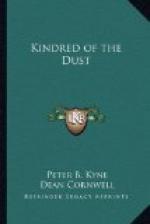When Elizabeth could catch Jane’s attention through the window she cautiously placed her finger on her lip and frowned a warning. Jane nodded her comprehension and promptly bore her mother off to bed where she gave the poor soul some salutary advice and left her to the meager comfort of solitude and smelling salts.
* * * * *
Just before he retired that night, The Laird saw a light shine suddenly forth from the Sawdust Pile. So he knew his son had selected a home for his bride, and rage and bitterness mingled with his grief and mangled pride to such an extent that he called upon God to take him out of a world that had crumbled about his hoary head. He shook his fist at the little light that blinked so far below him and Mrs. McKaye, who had crept down stairs with a half-formed notion of confessing to The Laird in the hope of mitigating her son’s offense—of, mother-like, taking upon her shoulders an equal burden of the blame—caught a glimpse of old Hector’s face, and her courage failed her. Thoroughly frightened she returned noiselessly to her room and wept, dry-eyed, for the fountain of her tears had long since been exhausted.
Meanwhile, down at the Sawdust Pile, Nan was putting her drowsy son to bed; in the little living-room her husband had lighted the driftwood fire and had drawn the old divan up to the blue flames. He was sitting with his elbows on his knees and his chin in his hands, outlining plans for their future, when Nan, having put her child to bed, came and sat down beside him. He glanced at her with troubled eyes and grinned a trifle foolishly.
“Happy?” he queried.
She nodded. “In a limited fashion only, dear heart. I’m thinking how wonderfully courageous you have been to marry me and how tremendously grateful I shall always be for your love and faith.” She captured his right hand and fondled it for a moment in both of hers, smiling a little thoughtfully the while as if at some dear little secret. “Port Agnew will think I married you for money,” she resumed presently; “your mother and sisters will think I married you to spite them and your father will think I married you because you insisted and because I was storm-tossed and had to find a haven from the world. But the real reason is that I love you and know that some day I am going to see more happiness in your eyes than I can see to-night.”
Again, in that impulsive way she had, she bent and kissed his hand. “Dear King Cophetua,” she murmured, “your beggar maid will never be done with adoring you.” She looked up at him with a sweet and lovely wistfulness shining in her sea-blue eyes. “And the sweetest thing about it, you angelic simpleton,” she added, “is that you will never, never, never know why.”
XLI
The first hint of the tremendous events impending came to Mr. Daney through the medium of no less an informant than his wife. Upon returning from the mill office on the evening of Donald McKaye’s marriage, Mr. Daney was met at his front door by Mrs. Daney who cried triumphantly:




